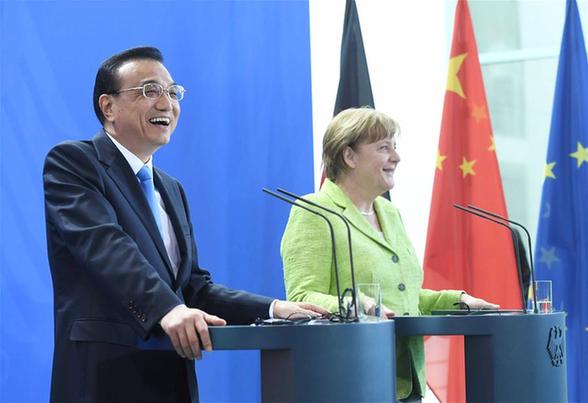Li Keqiang meets EU leaders at a crucial juncture of global re-alignment
- By Tim Collard
 0 Comment(s)
0 Comment(s) Print
Print E-mail China.org.cn, June 2, 2017
E-mail China.org.cn, June 2, 2017
|
|
|
Chinese Premier Li Keqiang and his German counterpart Angela Merkel meet reporters at a joint press conference in Berlin, Germany, June 1, 2017. [Photo/Xinhua] |
Premier Li then moved on to Brussels for the 19th meeting between Chinese and EU leaders, and though these meetings occur regularly, their timing is particularly apposite right now.
It has become apparent that one of the key relations underpinning global stability, the US-China partnership, is in a process of reorientation, largely due to the unpredictable course steered in the first six months of President Donald Trump's administration.
Following abandonment of support for the proposed Asia-Pacific trade agreement TPP, the Americans are now distancing themselves from the global climate change agreement reached in Paris in 2015 and signed by then President Barack Obama.
Both these policy reversals have effectively left China in the lead on the respective issues, and will necessitate the formation of new coalitions to ensure a common approach on global trade and climate change.
The Chinese Premier did not mince words. His speech placed the Sino-German relations firmly in the context of "global uncertainties, anti-globalization sentiment and rising protectionism in the world", an obvious reference to changing U.S. policies, adding that China and Germany should continue to promote trade liberalization and the creation of a propitious climate for investment, while safeguarding WTO rules.
In this context, it was vital to send positive signals to the wider world that a framework for stability and mutually beneficial partnerships still existed. The American change of tack has certainly left China as the leading protagonist of trade and investment liberalization, and the Li-Merkel talks in Berlin demonstrated firm German support for this agenda.
The two leaders did not, of course, limit themselves to the expression of good intentions. Practical results are keenly sought. These will come about by intensifying commercial exchanges, seeking for synergies between China's "Made in China 2025" strategy and its German counterpart "Industrie 4.0".
Promising areas for cooperative projects were named as manufacturing, energy, aviation, innovation, education, tourism, and the furthering of bilateral cooperation between SMEs. It is clear that two of the world's most innovative industrial nations have great partnership potential.
However, Germany, though a significant global player in her own right, is also valuable to China as the de facto leading light in the EU. Thus, it made sense to ensure a clear signal that Germany has responded positively to the Chinese approach, to set the scene for the wider meeting with EU leaders.
And so, before Li left Berlin for Brussels, the two heads of government announced they would speed up talks on a comprehensive China-EU investment agreement, aimed at furthering the mutual market opening, promoting trade liberalization and the facilitation of investment.
Indications are that, in the wake of the American disengagement on climate change, the EU leaders will join with China in reinforcing their commitment to the Paris agreement.
This is a significant juncture not just for China but also for the EU. The European grouping is also in a state of transition, owing to the UK's decision last year to withdraw. The detailed negotiations over the withdrawal and the rewriting of various trade agreements will last for some time; however, for the moment, it is important for the EU to register some clear successes, in order to dissuade other member countries from following Britain's lead and possibly undermining EU survival.
Chancellor Merkel was accordingly glad to secure a declaration of Chinese support for the European integration project, and a sign of solid progress on the trade and investment facilitation agreement can help to underpin that. A comprehensive EU-China free trade agreement has been under negotiation since 1984, it should be noted.
This is therefore a good moment for China to elicit European support for some key aims, such as securing an airworthiness certificate for its new large passenger aircraft, the C919. It will also help to position China as a good partner with Europe in the run-up to next month's G20 meeting in Hamburg, Chancellor Merkel's birthplace.
In Brussels, the plan is for Premier Li to co-chair the leaders' meeting with European Council President Donald Tusk and European Commission President Jean-Claude Juncker. He will also attend a China-EU business summit, a dialogue on cooperation in innovation, and a signing ceremony for cooperation agreements between Chinese and European SMEs, as well as other framework cooperation agreements.
However, these don't represent the main significance of Li's visit; this will be the global repositioning of the main players in the global economy to redress the imbalances caused by the current unpredictability in the American leadership.
Tim Collard is a columnist with China.org.cn. For more information please visit:
http://www.china.org.cn/opinion/timcollard.htm
Opinion articles reflect the views of their authors, not necessarily those of China.org.cn.







Go to Forum >>0 Comment(s)